Pas de biographie disponible.
Compositeur Musique additionelle Librettiste Parolier Metteur en scène Chorégraphe Producteur création Producteur version
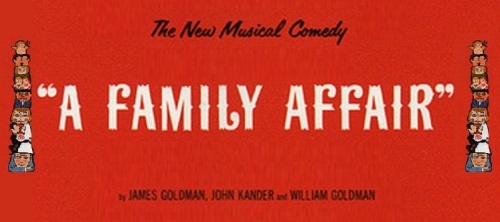
Musical
Musique: John Kander • Paroles: James Goldman • John Kander • Livret: James Goldman • William Goldman • Production originale: 1 version mentionnée
Dispo: Résumé Génèse Liste chansons
Genèse: Originally planned as a project for Gertrude Berg to be directed by Jerome Robbins, it opened in Philadelphia directed instead by Word Baker, who recently had staged The Fantasticks off-Broadway. With everything from the script to the score to the set in disarray, theatre producer Hal Prince was brought in to replace Baker and repair the damage. Poor box office prevented the out-of-town tryout from being extended and Prince, making his directorial debut, brought the show to New York City knowing it was better but still in need of serious work. The Broadway production opened on January 27, 1962 at the Billy Rose Theatre, where it ran for 65 performances and five previews. The cast included neurotic comic Shelley Berman as Alfie, Eileen Heckart as Tillie, Rita Gardner as Sally, and Larry Kert as Gerry, with Morris Carnovsky, Cathryn Damon, Bibi Osterwald, and Linda Lavin in supporting roles. An original cast recording was released by United Artists Records.
Résumé: In Chicago, Gerry Siegal and Sally Nathan, a young suburban Chicago couple, decide to marry. The bride's Uncle Alfie (her guardian) wants an intimate wedding and wages a war of words with the groom's entire family. The groom's brassy Jewish mother Tillie commandeers the planning, steering it towards a large country club wedding (despite her husband's scolding her for taking over). Caterers, dressmakers, band leaders, rabbis, florists, photographers and a bossy wedding planner are pushed to the limit by the madcap preparations. The bride and groom, who have retained their sanity, realize that their families have almost destroyed the wedding. They announce their intention to have a quiet family affair.
Création: 27/1/1962 - Nederlander Theatre (Broadway) - 65 représ.
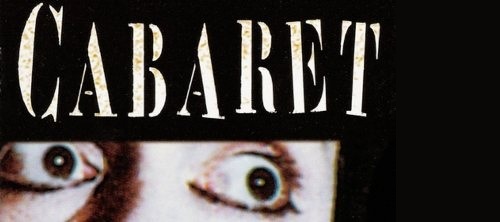
Musical
Musique: John Kander • Paroles: Fred Ebb • Livret: Joe Matseroff • Production originale: 36 versions mentionnées
Dispo: Résumé Synopsis Commentaire Génèse
Vidéos:
Set in 1931 Berlin as the Nazis are rising to power, it focuses on nightlife at the seedy Kit Kat Klub and revolves around the 19-year-old English cabaret performer Sally Bowles and her relationship with the young American writer Cliff Bradshaw. A sub-plot involves the doomed romance between German boarding house owner Fräulein Schneider and her elderly suitor Herr Schultz, a Jewish fruit vendor. Overseeing the action is the Master of Ceremonies at the Kit Kat Klub which serves as a constant metaphor for the tenuous and threatening state of late Weimar Germany throughout the show.
Genèse: Sandy Wilson, who had achieved success with The Boy Friend in the 1950s, had completed the book and most of the score for Goodbye to Berlin, his musicalization of I Am a Camera, when he discovered producer David Black's option on both the 1951 Van Druten play and its source material by Christopher Isherwood had lapsed and been acquired by Harold Prince. Prince commissioned Joe Masteroff to work on the book, and when the two men agreed Wilson's score failed to capture the essence of late-1920s Berlin, John Kander and Fred Ebb were invited to join the project. The new version was initially a dramatic play preceded by a prologue of songs describing the Berlin atmosphere from various points of view. As the composers began to distribute the songs between scenes, they realized the story could be told in the structure of a more traditional book musical, and they replaced some of the songs with tunes more relevant to the plot. Isherwood's original characters began to change as well. The male lead became an American writer who teaches English; the anti-Semitic landlady was transformed into a tolerant woman with a Jewish beau, Herr Schultz, who owned a fruit store; two language students were eliminated; and two loathsome but integral characters - prostitute Fräulein Kost and Nazi Ernst Ludwig - were added to the mix. The musical ultimately became two separate stories in one, the first a revue centered on the decadence of the seedy Kit Kat Klub, the second a story set in the real world in which the club existed. After seeing one of the last rehearsals before the company headed to Boston for the pre-Broadway run, Jerome Robbins suggested the musical sequences outside the cabaret be eliminated. Although Prince ignored his advice, Bob Fosse did just that when he directed the film adaptation. In Boston, Jill Haworth struggled with her characterization of cabaret performer Sally Bowles. She was a blonde dressed in a white dress that suggested senior prom more than tawdry nightclub. Prince's staging was unusual for the time. As the audience filled the theater, the curtain was already up, revealing a stage containing nothing but a large mirror reflecting the auditorium. There was no overture; instead, a drum roll and cymbal crash led into the opening number. The juxtaposition of dialogue scenes with songs used as exposition and separate cabaret numbers providing social commentary was a novel concept that initially startled the audience, but as they gradually came to understand the difference between the two, they were able to accept the reasoning behind them. Original Broadway Production) After 21 previews, the original Broadway production, directed by Harold Prince and choreographed by Ron Field, opened on November 20, 1966 at the Broadhurst Theatre, eventually transferring first to the Imperial and then the Broadway before finally completing its 1,165-performance run. The cast included Jill Haworth as Sally, Bert Convy as Cliff, Lotte Lenya as Fräulein Schneider, Jack Gilford as Herr Schultz, Joel Grey as the Emcee, Edward Winter as Ernst and Peg Murray as Fräulein Kost. Replacements later in the run included Anita Gillette and Melissa Hart as Sally, Ken Kercheval and Larry Kert as Cliff, and Martin Ross as the Emcee. Original London Production The first West End production opened on February 28, 1968 at the Palace Theatre with Judi Dench as Sally, Barry Dennen as the Emcee, Lila Kedrova as Fräulein Schneider and Peter Sallis as Herr Schultz. It ran for 336 performances. 1986 London Revival In 1986, the show was revived in London at the Strand Theatre starring Kelly Hunter as Sally, Peter Land as Cliff and Wayne Sleep as the Emcee directed and choreographed by Gillian Lynne. 1987 Broadway Revival The first Broadway revival opened on October 22, 1987, with direction and choreography once again by Prince and Field. The revival opened at the Imperial Theatre, eventually transferring to the Minskoff to complete its 261-performance run. Joel Grey received star billing as the Emcee, with Alyson Reed as Sally, Gregg Edelman as Cliff, Regina Resnik as Fräulein Schneider, Werner Klemperer as Herr Schultz. and David Staller as Ernst Ludwig. The song "Don't Go" was added for Cliff's character. 1993 London revival In 1993, Sam Mendes directed a new production of the show for the Donmar Warehouse in London's West End. It starred Jane Horrocks as Sally, Adam Godley as Cliff, Alan Cumming as the Emcee and Sara Kestelman as Frau Schneider. Cumming received an Olivier Award nomination for his performance and Kestelman won the Olivier for Best Supporting Performance in a Musical. Mendes' conception was a very different show from either the original production or the rather conventional first revival. The most significant change was the character of the Emcee. The role, as played by Joel Grey, in both prior incarnations, was an asexual, malevolent character in a tuxedo with rouged cheeks. Alan Cumming's portrayal was highly sexualized, wearing suspenders (i.e. braces) around his crotch and red paint on his nipples. The cabaret number "Two Ladies" was staged with the Emcee, a cabaret girl, and a cabaret boy in drag and included a shadow play simulating various sexual positions. The score was entirely re-orchestrated, utilizing synthesizer effects and expanding the stage band, with all the instruments now being played by the cabaret girls and boys. The brutally satiric "Sitting Pretty", with its mocking references to deprivation, despair and hunger, was eliminated entirely, as it had been in the film version, and replaced with "Money". "I Don't Care Much", which was cut from the original production, was reinstated, and "Mein Herr" and "Maybe This Time", written for the film adaptation, were added to the score.[5] Staging details differed as well; instead of "Tomorrow Belongs To Me" being performed by a male choir, the Emcee plays a recording of a boy soprano singing it. Most dramatic of all was in the final scene in which the Emcee removes his outer clothes to reveal a striped suit of the type worn by the internees in concentration camps on which were pinned a yellow badge (identifying a Jewish prisoner) and a pink triangle (denoting a homosexual prisoner). Other changes included added references to Cliff's bisexuality, including a brief scene where he kisses one of the Cabaret boys. 1998 Broadway revival The second Broadway revival was based on the 1993 Mendes-Donmar Warehouse production. For the Broadway transfer, Rob Marshall was brought on board as co-director and choreographer. The production opened after 37 previews on March 19, 1998 at the Kit Kat Klub, housed in what previously had been known as Henry Miller's Theatre. Later that year it transferred to Studio 54, where it remained for the rest of its 2,377-performance run, becoming the third longest-running revival in Broadway musical history, third only to Oh! Calcutta! And Chicago. For the Broadway production, Cumming reprised his role as the Emcee, opposite newcomers Natasha Richardson as Sally, John Benjamin Hickey as Cliff, Ron Rifkin as Herr Schultz, Michelle Pawk as Fräulein Kost, and Mary Louise Wilson as Fräulein Schneider. The Broadway production was nominated for ten Tony Awards, winning four for Cumming, Richardson and Rifkin as well as the Tony for Best Revival of a Musical. This production featured a number of notable replacements later in the run: Jennifer Jason Leigh, Susan Egan, Joely Fisher, Gina Gershon, Deborah Gibson, Teri Hatcher, Melina Kanakaredes, Jane Leeves, Molly Ringwald, Brooke Shields, and Lea Thompson as Sally; Michael C. Hall, Raúl Esparza, Neil Patrick Harris, Adam Pascal, Jon Secada, Norbert Leo Butz and John Stamos as the Emcee; Boyd Gaines and Michael Hayden as Cliff; Tom Bosley, Dick Latessa, Hal Linden, Laurence Luckinbill, and Tony Roberts as Herr Schultz; and Blair Brown, Polly Bergen, Mariette Hartley and Carole Shelley as Fräulein Schneider. 2006 London Revival In September 2006, a new production of the show opened at the Lyric Theatre, directed by Rufus Norris, and starring Anna Maxwell Martin as Sally, James Dreyfus as the Emcee, Harriet Thorpe as Fräulein Kost and Sheila Hancock as Fräulein Schneider. Hancock won the Olivier Award for Best Supporting Performance in a Musical. Replacements later in the run included Kim Medcalf and Amy Nuttall as Sally, Honor Blackman and Angela Richards as Fräulein Schneider, and Julian Clary and Alistair McGowan as the Emcee. This production closed in June 2008 and toured nationally for two years with a cast that included Wayne Sleep as the Emcee and Samantha Barks and Siobhan Dillon as Sally.
Résumé: CABARET raconte l'histoire d'un jeune écrivain américain qui, au cours d'un voyage à Berlin au début des années 30, tombe amoureux de Sally Bowles, la meneuse de revue de la boîte de nuit Kit Kat Klub. Il découvre alors les idées libertaires et les mœurs sans tabou qui soufflent dans le monde de la nuit berlinoise, au temps où les nazis s'activent à mettre sur pied le troisième Reich. Sally Bowles et le maître de cérémonie du club essayent alors grâce à leur divertissement extravagant de faire oublier aux spectateurs les difficultés de la vie et les menaces grandissantes du monde extérieur.
Création: 20/11/1966 - Broadhurst Theatre (Broadway) - représ.

Musical
Musique: John Kander • Paroles: Fred Ebb • Livret: Joseph Stein • Production originale: 1 version mentionnée
Dispo: Résumé Génèse Liste chansons
Adapted from the 1952 novel Zorba the Greek by Nikos Kazantzakis and the subsequent 1964 film of the same name, it focuses on the friendship that evolves between Zorba and Nikos, a young American who has inherited an abandoned mine on Crete, and their romantic relationships with a local widow and a French woman, respectively.
Genèse: Original Broadway Production The musical opened on Broadway on November 16, 1968 at the Imperial Theatre, where it ran for 305 performances and twelve previews. Directed by Harold Prince and choreographed by Ron Field, the cast included Herschel Bernardi, Maria Karnilova, Carmen Alvarez, John Cunningham, and Lorraine Serabian. Scenic design was by Boris Aronson, costume design was by Patricia Zipprodt, and lighting design was by Richard Pilbrow. The production received several Tony Award nominations, winning the Tony Award for Best Scenic Design. 1970 US tour The musical was revised to be less "austere" and toured with John Raitt, and included a new song for him ("Bouboulina"). Chita Rivera played the role of "The Leader". Because reviews were not favorable, the show did not return to Broadway at that time. The bus and truck tour featured Vivian Blaine ("Guys and Dolls") as Madam Hortense and Michael Kermoyan ("Camelot" & "Anya") in the title role, with Prince directing and choreography by Patricia Birch. 1983 Broadway Revival The 1983 revival directed by Michael Cacoyannis and choreographed by Graciela Daniele opened on October 16, 1983 at the Broadway Theatre, where it ran for 362 performances and 14 previews. The cast included Anthony Quinn and Lila Kedrova (who had both starred in the film version, the latter winning an Oscar for her performance), in addition to Robert Westenberg, Debbie Shapiro, and Rob Marshall. Other productions Zorba has been produced professionally in Argentina (2003). Cast: Raúl Lavié, María Rosa Fugazot, Miguel Habud, Julia Zenko, Marcelo Trepat, Alejandro Viola (replaced by Gustavo Monje), Roberto Fiore and Andrea Mango. Broadway Revival Zorba was expected to be revived on Broadway in 2011, with David Leveaux set to direct. Antonio Banderas had been chosen as Zorba.[4] In an interview with producer Fran Weissler, the revival of Zorba is set for 2011-2012. As of May 2015 this revival has not been produced. Cara Joy David, writing in the Huffington Post in January 2015, wrote: "Zorba...The production was expected to be mounted during the 2011-2012 theatrical season. Alas it never came to be.... or at least not yet." Concert production Zorba was presented in the New York City Center Encores! staged concert series on May 6-10, 2015. The cast featured John Turturro, Zoe Wanamaker, and Marin Mazzie in the lead roles and direction by Walter Bobbie.[7]
Résumé: The setting is Crete in 1924. Nikos, a young student, has inherited a mine which he plans to resurrect to its working state. With his new friend, Zorba, he travels from Piraeus and lodges with a French woman, Hortense. It soon becomes apparent that Zorba and Hortense are attracted to each other and there soon becomes a romantic involvement. Zorba tries to get Nikos interested in a young Widow who brings them lunch but Nikos treads wearily. Zorba is very much his own man and a law unto himself. Nikos has given him money with which to buy supplies to enable them to reopen the mine but Zorba goes off and spends it all on a belly dancer. Hortense, meanwhile is romantically dreaming of marriage with Zorba - and a wedding ring! Despite his misgivings Nikos plucks up his courage and goes to visit the Widow. Their meeting is witnessed by a young man, Pavli, who is somewhat mentally unbalanced. resulting from witnessing the assignation of the Widow and Nikos, Pavli throws himself into the sea. Next morning, village celebrations are stilled when Pavli's body is washed up onto the shore. Zorba returns to the village with no supplies for the mine, no money and no wedding ring for Hortense. Nikos tells the Widow how much she means to him - and the feelings are reciprocated. But their love comes too late. A member of Pavli's family stabs her to death, blaming her for Pavli's suicide. The bad news does not stop here. A survey of the mine shows that it has been closed too long and that it will be impossible to reopen it. Zorba is a philosophical man, but Nikos cannot understand Zorba's attitude to those who killed the Widow. Zorba explains that one must accept death as one accepts life, all there is left to do is dance. Hortense has become very ill and in her delirium, she imagines she is a young girl again. Zorba rushes to her side but to no avail. Nikos and Zorba, in their mutual grief, begin to dance. Nikos decides to return to Athens - and Zorba to wherever life leads him.
Création: 16/11/1968 - Imperial Theatre (Broadway) - représ.

Musical
Musique: John Kander • Paroles: Fred Ebb • Livret: Fred Ebb • Production originale: 31 versions mentionnées
Dispo: Résumé Synopsis Commentaire Génèse Isnpiration Liste chansons
Genèse: According to Fred Ebb, he wrote the book in a vaudeville style because "the characters were performers. Every musical moment in the show was loosely modeled on someone else: Roxie was Helen Morgan, Velma was Texas Guinan, Billy Flynn was Ted Lewis, Mama Morton was Sophie Tucker." Kander elaborates that the reason the show was called a vaudeville "is because many of the songs we wrote are related to specific performers like those you mentioned, and Eddie Cantor and Bert Williams as well." It was through the initial production, and not the writing, that many of the "traditional" Chicago staging conventions were developed: The double snap in "Razzle Dazzle" was added as an afterthought at the suggestion of Fred Ebb to John Kander. Kander explains: "I remember when we wrote "Razzle Dazzle", before we took it in and played it for Bob, you [Ebb] said with absolute confidence 'Try adding a couple of finger snaps to it. Bobby will love that.' We added them...and as soon as he heard the finger snaps, he loved the song." During rehearsals, "Razzle Dazzle" was originally staged as an orgy on the steps of the courthouse. Fosse was talked out of allowing this staging, when Jerry Orbach "convinced him that he was missing the Brechtian subtlety intrinsic in the number." The original finale was "Loopin' the Loop", a doubles act with Gwen Verdon and Chita Rivera; however, "the scene seemed too much like an amateur act so Fosse asked for something more 'glamorous in pretty gowns'". The piece was cut and replaced with "Nowadays". Sections of "Loopin' the Loop" can still be heard in the Overture.[7] Two other sections termed "Keep It Hot" and "RSVP" were cut from the finale as well. Another principal character was played by David Rounds and known simply as "The Agent," whose role was to exploit the notoriety of the prisoners for his own gain. He also served as the evening's M.C. This character's role and the song "Ten Percent" was cut, with the character folded into that of Matron Mama Morton, and various members of the chorus shared his emcee duties. In a reversal of roles, Fosse decided the lyrics to the number "Class" were too offensive and censored Kander and Ebb's original version of the song. One of the original lyrics "Every guy is a snot/Every girl is a twat" was restored for the 2002 movie, although the entire number was cut from the final release of the movie. Original Broadway production Chicago: A Musical Vaudeville opened on June 3, 1975 at the 46th Street Theatre, and ran for a total of 936 performances, closing on August 27, 1977. The opening night cast starred Chita Rivera as Velma Kelly, Gwen Verdon as Roxie Hart, Jerry Orbach as Billy Flynn and Barney Martin as Amos Hart. Velma Kelly had been a comparatively minor character in all versions of Chicago prior to the musical rendering. The role was fleshed out to balance Chita Rivera's role opposite Gwen Verdon's Roxie Hart. The musical received mixed reviews. The Brechtian style of the show, which frequently dropped the fourth wall, made audiences uncomfortable. According to James Leve, "'Chicago' is cynical and subversive, exploiting American cultural mythologies in order to attack American celebrity culture." The show opened the same year as Michael Bennett's highly successful A Chorus Line, which beat out Chicago in both ticket sales and at the Tony Awards. The show was on the verge of closing, when it ran into another setback: Gwen Verdon had to have surgery on nodes in her throat after inhaling a feather during the show's finale. The producers contemplated closing the show, but Liza Minnelli stepped in and offered to play the role of Roxie Hart in place of Verdon. Her run lasted a month, boosting the show's popularity, and Gwen Verdon recuperated and returned to the show. Later during the run, Ann Reinking, who would go on to star in the highly successful 1996 revival and choreograph that production in the style of Bob Fosse, was also a cast replacement for Roxie Hart during the show's original run. 1979 West End The first West End, London production opened at the Cambridge Theatre in April 1979 and ran for around 600 performances.[16] It starred Jenny Logan as Velma Kelly and Antonia Ellis as Roxie Hart. Ellis (Actress of the Year in a Musical) and Ben Cross (Actor of the Year in a Musical) were nominated for the Olivier Award for their performances, and the musical was nominated as Musical of the Year. 1996 Broadway revival City Center Encores! series presented Chicago in May 1996. The series had been previously used exclusively to bring attention to older, more obscure musicals that might have otherwise been forgotten. The production was directed by Walter Bobbie with choreography "in the style of Bob Fosse" by Ann Reinking, who also starred as Roxie Hart. Also in the show was Bebe Neuwirth as Velma Kelly, Joel Grey as Amos Hart and James Naughton as Billy Flynn. Performers were holding scripts and the choreography was sometimes unpolished. The show was well-received, with Howard Kissel, reviewing for the New York Daily News writing that "This 'Chicago' impressed me far more than the original.".[19] Ben Brantley, in his review for The New York Times, wrote " 'Make love to the audience' was another Fosse dictum. That's exactly what Ms. Reinking and her ensemble do. 'Chicago' can still seem glibly cynical and artificially cold, especially in its weaker second act. But these performers know just how to take off the chill." By May 10, 1996, there was talk of a Broadway production: "Down the block, there is a move afoot to move the Encores production of "Chicago" to Broadway. Rocco Landesman said that he and Fran and Barry Weissler wanted to bring the production to the Martin Beck Theater this summer." Barry and Fran Weissler brought the concert version of Chicago, now titled Chicago: The Musical, directly to Broadway, where it opened on November 14, 1996, with a new script by David Thompson. The show set a record for recovering its initial costs faster than any other musical in history. This is likely due to the stripped down nature of the show: the set is nothing more than a giant bandstand, and the costumes are minimalist and black. Unlike its predecessor Chicago: A Musical Vaudeville, Chicago: The Musical was met with praise from audiences and critics alike. Society had changed in light of events such as the O. J. Simpson murder case, and audiences were more receptive to the criminal-as-celebrity theme of the show. Chicago: The Musical won six Tony Awards, more than any other revival in Broadway history until being beat out by South Pacific which won seven, winning for Best Revival of a Musical, Best Leading Actress in a Musical for Bebe Neuwirth, Best Leading Actor in a Musical for James Naughton, Best Lighting Design of a Musical for Ken Billington, Best Director of a Musical for Walter Bobbie and Best Choreography for Ann Reinking. While still married to Verdon, Fosse also romanced Reinking, who eventually took over the role of Roxie when Verdon left the show. Reinking reprised this role in the 1996 revival, when she was 46. Chicago: The Musical has run for over 5,400 performances as of January 10, 2010 and holds the record for longest-running musical revival on Broadway. Chicago is currently the fourth longest-running Broadway show ever. During its run, the show has played in three Broadway theatres - the Richard Rodgers Theatre (the same theatre where the original 1975 production played, at the time called the 46th Street Theatre), the Shubert Theatre and the Ambassador Theatre. The Grammy Award winning cast recording of the revival was released on January 28, 1997. The show currently features Tony Yazbeck (Billy Flynn), Chris Sullivan (Amos), Carol Woods (Matron "Mama" Morton), Kara DioGuardi (Roxie), and Amra-Faye Wright (Velma). Among the many other performers and celebrities who have appeared in the show during its long run are Usher, Michael C. Hall, Jerry Springer, Brooke Shields, Kevin Richardson, Melora Hardin, Rita Wilson, Melanie Griffith, Taye Diggs, Chandra Wilson, John O'Hurley, Ashlee Simpson, Leigh Zimmerman[25], Samantha Harris, Marilu Henner, Jeff McCarthy, Christie Brinkley, and Sofía Vergara. 1997 London revival On November 18, 1997, Chicago: The Musical opened in London's West End.[27][28] Like the New York revival, it is directed by Walter Bobbie and designed by John Lee Beatty, with choreography by Ann Reinking in the style of Bob Fosse. The show ran at the Adelphi Theatre for nine years until transferring to the Cambridge Theatre in April 2006. The original cast of the production included German jazz singer, Ute Lemper as Velma, British actress Ruthie Henshall as Roxie Hart, Nigel Planer as Amos Hart and Henry Goodman as Billy Flynn. The production won the 1998 Olivier Award for Outstanding Musical, and Lemper was awarded Best Actress in a Musical. Both Ute Lemper and Ruthie Henshall have played the role of Velma Kelly on Broadway to great acclaim. The London production, like its Broadway counterpart, has featured many acclaimed international celebrities and actors in the starring roles. For example, Marti Pellow, David Hasselhoff, John Barrowman, Tony Hadley, Jerry Springer, Kevin Richardson, and Ian Kelsey have all played the role of Billy Flynn since 2002. Maria Friedman, Josefina Gabrielle, Denise Van Outen, Claire Sweeney, Linzi Hateley, Frances Ruffelle, Jennifer Ellison, Jill Halfpenny, Brooke Shields, Sally Ann Triplett, Bonnie Langford, Tina Arena, Ashlee Simpson, Aoife Mulholland, Michelle Williams, and Christie Brinkley have all played Roxie Hart since 1998. Williams was the first African American woman to play the part of Roxie on the West End stage. There is also a professional touring cast of the musical. The revival closed at the Cambridge Theatre on August 27, 2011 in its 14th year and will re-open at the Garrick Theatre on 7 November 2011, starring America Ferrera as Roxie.
Résumé: Chicago, années 20, "une histoire de meurtre, de cupidité, de corruption, de violence, de manipulation, d'adultère et de trahison". Le meurtre, c'est le moyen qu'ont choisi les héroïnes, Roxie Hart et Velma Kelly, pour accéder à la célébrité dans un monde où tuer est un art. La corruption, c'est ce qui caractérise Mama Morton, la gardienne de la prison où sont enfermées les héroïnes, même si elle préfère appeler son système la "réciprocité". La manipulation, c'est l'instrument préféré de Billy Flynn, la star des avocats que se disputent les meurtrières. Par son charisme et son éloquence, ce manipulateur-né séduit habilement ses clientes, déstabilise les témoins, hypnotise les journalistes et les jurés. L'adultère, la cupidité et la trahison sont autant de mobiles du crime, de sujets d'articles à sensation… ce sont aussi autant d'actes que subit passivement Amos, mari de Roxie, symbole du " pauvre type " qui ne maîtrise aucun événement. Quant à la violence, c'est celle des personnages et de leurs actes mais aussi celle des mots de cette comédie musicale subversive.
Création: 3/6/1975 - Richard Rodgers Theatre (Broadway) - représ.
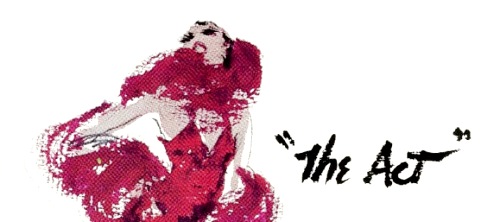
Musical
Musique: John Kander • Paroles: Fred Ebb • Livret: George Furth • Production originale: 1 version mentionnée
Dispo: Génèse Liste chansons
Vidéos:
Genèse: With an all-time ticket-price high of $25 for Saturday night orchestra seats, The Act had $2 million in advance sales, then the highest in Broadway history. But the production was doomed from the start, with its star in erratic behavior and frequently-missed performances, more than 10% of the entire run. During out-of-town tryouts, Gower Champion was called in to help with the staging (but took no directorial credit). Additionally, the original costumes were replaced. With the additional costs and with refund demands running high, it was impossible for the show to recoup its costs.
Résumé:
Création: 29/10/1977 - Majestic Theatre (Broadway) - 233 représ.
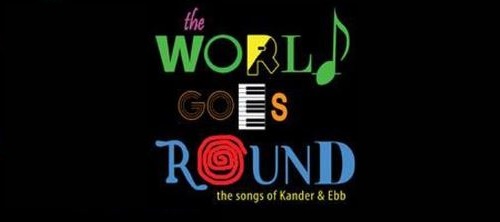
Musical
Musique: John Kander • Paroles: Fred Ebb • Livret: *** Revue • Production originale: 1 version mentionnée
Dispo: Résumé Synopsis Génèse Liste chansons
Enter the world of distinguished and celebrated writing team Kander and Ebb. The World Goes 'Round is a stunning revue of the songbook from the multi-TONY-award-winning team with the original production winning 3 Drama Desk Awards.
Genèse: The World Goes 'Round is a musical revue showcasing the songs of John Kander and Fred Ebb. The revue takes its title from a tune the songwriting team wrote for Liza Minnelli to sing in the Martin Scorsese film New York, New York. The show consists of an eclectic collection of love songs, torch songs, and acerbicly witty comic numbers. It was conceived by director Scott Ellis, choreographer Susan Stroman, and librettist David Thompson, who collaborated on such Kander and Ebb shows as Steel Pier and the 1996 revival of Chicago. David Loud created the vocal and dance arrangements. Productions The World Goes 'Round premiered in New York City on March 18, 1991 at the Westside Theatre. Its cast included Karen Ziemba, Robert Cuccioli, Karen Mason, Brenda Pressley, and Jim Walton. The show received critical praise and a satisfying run of 408 performances. Starting in August 1992, Ziemba, Blum, and Mazzie were joined by John Ruess and Shelley Dickinson for a 10-month US national tour. With scenic and technical embellishments added and the title simplified to The World Goes 'Round, the revised edition included mostly upbeat, unfamiliar songs from the team's lesser-known musicals.
Résumé: Filled with humor, romance, drama, and nonstop melody this title is a thrilling celebration of life and the fighting spirit that keeps us all going. Five individuals find themselves careening through the world of love, babies, and coffee. From Cabaret to Chicago the non-stop hit-parade features unforgettable gems including "Mr. Cellophane," "Maybe this Time," "Cabaret," and "New York, New York", seamlessly interwoven into a passionate, harmonious, up-tempo evening of musical theatre.
Création: 18/3/1991 - Westside Theatre Downstairs (Broadway (Off)) - représ.
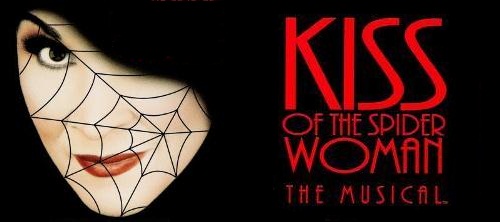
Musical
Musique: John Kander • Paroles: Fred Ebb • Livret: Terrence McNally • Production originale: 9 versions mentionnées
Dispo: Résumé Synopsis Génèse Isnpiration Liste chansons
Genèse: Kiss of the Spider Woman was given a workshop by New Musicals, whose goal was to create, develop, and provide a working home for sixteen new musicals over four years, at the Performing Arts Center, State University of New York at Purchase in May 1990. It was directed by Harold Prince with choreography by Susan Stroman and featured John Rubinstein, Kevin Gray, Lauren Mitchell, and Harry Goz. An attempt to persuade New York critics not to review this initial production (given its workshop status) failed, with Frank Rich in The New York Times, followed by other critics covering the production and filing mostly negative reviews. New Musicals folded after Spider Woman. Two years later, the producer Garth Drabinsky became involved, and his company, Livent, produced the show in Toronto at the St. Lawrence Centre for the Arts, Bluma Appel Theatre in June 1992. The cast starred Brent Carver as Molina, Anthony Crivello as Valentin and Chita Rivera as Spider Woman/Aurora. Kiss of the Spider Woman premiered in the West End at the Shaftesbury Theatre on October 20, 1992, where it ran for 390 performances. Directed by Harold Prince with choreography by Rob Marshall, it starred Brent Carver as Molina, Anthony Crivello as Valentin, and Chita Rivera as Spider Woman/Aurora. The production won the Evening Standard Award for Best Musical. It opened on Broadway at the Broadhurst Theatre on May 3, 1993 and closed on July 1, 1995 after 904 performances. It was again directed by Harold Prince, with choreography by Vincent Paterson and Rob Marshall, scenic design and projection design by Jerome Sirlin, costume design by Florence Klotz, and lighting design by Howell Binkley. The cast included Brent Carver, Anthony Crivello and Chita Rivera repeating their roles, as well as Merle Louise and Kirsty Carnahan. Carver, Crivello, and Rivera won Tony Awards for their performances. Notable replacements included: Brian Stokes Mitchell (Valentin), Howard McGillin and Jeff Hyslop (Molina); and, as Aurora: María Conchita Alonso, Vanessa L. Williams, and Carol Lawrence. The teaming of McGillin, Williams, and Mitchell was so strong that many critics felt they were superior to the original cast, and in a rare step a second cast album was recorded featuring these principles. It opened in Buenos Aires, Argentina at the Lola Membrives Theatre on May 2, 1995. Directed by Harold Prince, with choreography by Vincent Paterson and Rob Marshall, the cast included Valeria Lynch in the title role, Juan Darthes and Anibal Silveyra. It was translated into Spanish by Pedro Orgambide and Alberto Favero.
Résumé: KISS OF THE SPIDER WOMAN is the beautifully haunting tale of two prisoners incarcerated in the most terrible of places. But out of their despair, they weave a touching tale of life, love, and loss. Molina begins to share his fantasies of Aurora, the actress of his dreams. Much to Valentin’s surprise, Molina’s stories begin to appear, transporting them into a world of vibrant color and feeling, a far cry from their dreary prison cell.
Création: 8/6/1992 - Bluma Appel Theatre (Toronto) - représ.
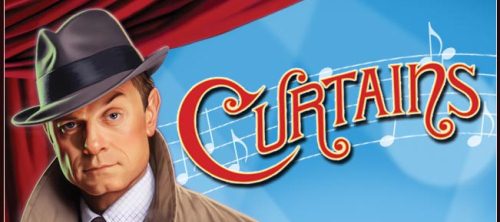
Musical
Musique: John Kander • Paroles: Fred Ebb • Livret: Ruppert Holmes • Production originale: 4 versions mentionnées
Dispo: Résumé Synopsis Génèse Liste chansons
Genèse: Curtains is a musical with a book by Rupert Holmes, lyrics by Fred Ebb, and music by John Kander, with additional lyrics by Kander and Holmes. Based on the original book and concept by Peter Stone, the musical is a send-up of backstage murder mystery plots, set in 1959 Boston, Massachusetts and follows the fallout when the supremely untalented star of Robbin' Hood of the Old West is murdered during her opening night curtain call. It is up to a police detective who moonlights as a musical theater fan to save the show, solve the case, and maybe even find love before the show reopens, without getting killed himself. Stone died in April 2003, leaving the book unfinished, and Holmes was hired to rewrite it. Ebb also died before the musical was completed. Curtains had its world premiere on July 25, 2006 at the Ahmanson Theatre in Los Angeles. Local reviews were mixed but not discouraging, and the producers decided to transfer the show to Broadway with minor alterations. The production, directed by Scott Ellis and choreographed by Rob Ashford, opened on Broadway on March 22, 2007 at the Al Hirschfeld Theatre. The cast included David Hyde Pierce, Debra Monk, Karen Ziemba, Edward Hibbert, Jason Danieley, Noah Racey, Jill Paice, Megan Sikora, Michael X. Martin, Michael McCormick, and John Bolton reprising the roles they played in Los Angeles, as well as new cast member Ernie Sabella. The musical garnered eight Tony Award nominations, with Hyde Pierce winning the award for Best Performance by a Leading Actor in a Musical. Curtains closed on June 29, 2008 after 511 performances and twenty-three previews. The musical received mixed reviews on Broadway, with Ben Brantley writing in The New York Times :"David Hyde Pierce…steps into full-fledged Broadway stardom with his performance here…Perhaps this switching of creative horses accounts for the enervation that seems to underlie the lavish expenditure of energy by a top-of-the line cast that includes Debra Monk, Karen Ziemba and Jason Danieley. Brightly packaged, with Kiss Me, Kate-style sets by Anna Louizos and costumes to match by the industrious William Ivey Long, Curtains lies on the stage like a promisingly gaudy string of firecrackers, waiting in vain for that vital, necessary spark to set it off." Clive Barnes wrote in the New York Post: "Part of the trouble was director Scott Ellis' failure to italicize sufficiently the inside comedy, but there probably wasn't much he could do. The choreography by Rob Ashford was unnoticeable, the scenery by Anna Louizos uninterestingly ugly, while William Ivey Long unwisely saved his best and funniest costumes for the curtain calls. Through all this farrago, Hyde Pierce moved (or, in that curtain call, "rode") with unshatterable aplomb - taking the basically comic concept of a tough plainclothes detective as a musical comedy queen, and running with it just as far, and even a bit beyond, as the material could take it.
Résumé: A backstage musical comedy murder mystery set in a Boston theatre in the 1950s. The leading lady has been murdered during the curtain call and homicide detective (and musical theatre afficianado) Frank Cioffi is called in to investigate. Bodies begin to pile up as the cast shrinks and everyone is a suspect.
Création: 22/3/2007 - Al Hirschfeld Theatre (Broadway) - représ.
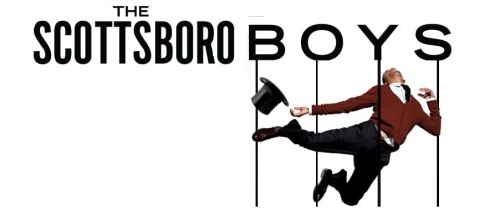
Musical
Musique: John Kander • Paroles: Fred Ebb • Livret: David Thompson • Production originale: 5 versions mentionnées
Dispo: Résumé
Genèse:
Résumé: The Scottsboro Boys s’inspire, en prenant quelques libertés, de l’histoire vraie d’une calamité judiciaire dans laquelle neuf hommes noirs furent jugés en Alabama en 1931 pour le viol de deux femmes blanches sur la foi de témoignages pour le moins bancals. Huit furent condamnés à mort ; le neuvième avait treize ans (mais il ne se trouva qu’un seul juré pour ne pas voter la peine de mort !). Il s’ensuivit une épopée politico-judiciaire de près de vingt ans qui vit s’enchaîner les procès, les appels, deux passages par la Cour Suprême des États-Unis, etc. Certains des “Scottsboro Boys” finirent par être remis en liberté. Tous laissèrent leur vie au moins symboliquement dans cette histoire à défaut de la perdre sur la chaise électrique.
Création: 10/3/2010 - Vineyard Theatre (Broadway (Off)) - représ.

Musical
Musique: John Kander • Paroles: Fred Ebb • Livret: Terrence McNally • Production originale: 2 versions mentionnées
Dispo: Résumé Synopsis Commentaire Génèse Isnpiration Liste chansons
Based on Friedrich Dürrenmatt's 1956 satirical play about greed and revenge Der Besuch der alten Dame, it focuses on one of the world's wealthiest women, Claire Zachanassian, who returns to her financially depressed hometown and offers its residents a new lease on life in exchange for the murder of Anton Schell, the man who abandoned her years ago.
Genèse: The musical adaptation of The Visit was originally developed as a vehicle for Angela Lansbury and was scheduled for a Broadway opening on March 15, 2001. It had been scheduled for a try-out in Boston for December 2000–January 2001. Frank Galati was the director with Ann Reinking as choreographer, and co-starring Philip Bosco. However, in July 2000 Lansbury withdrew due to the illness and subsequent death of her husband. Chicago, 2001 Chita Rivera was signed as Lansbury's replacement and the musical, directed by Frank Galati and choreographed by Ann Reinking, was staged with Rivera and John McMartin by the Goodman Theatre, Chicago, opening on October 1, 2001. Galati said that because of the September 11, 2001 attacks the show did not move to Broadway: "It was generally a success, but we couldn't get anyone from New York or California to see it. People weren't flying." In that climate, he says, "the whole idea of moving a very dark parable about human greed, the dark side of human nature," was difficult. Reinking said: "By the time you really could travel and people felt safe again, our run was up." Regional theatre productions were considered as an alternative, while McNally rewrote the book. Then, in late 2003, The Public Theater announced it was mounting an off-Broadway production with Rivera and Frank Langella early the following year, but that too was cancelled when financing fell through. Signature Theatre, 2008 The Signature Theatre in Arlington, Virginia production of The Visit, began previews on May 13, 2008, officially opened on May 27 and ran through June 22. With direction by Frank Galati and choreography by Ann Reinking, Rivera was once again in the lead, with co-stars George Hearn and Mark Jacoby. Prior to this production, a closed reading was held on February 19, 2008, with, among others, Jayne Houdyshell, Florence Lacey, and Jason Danieley, joining Rivera, Hearn and Mark Jacoby. Concert, 2011 On November 30, 2011, Rivera and John Cullum, directed by Carl Andress, starred in a stage concert at the Ambassador Theatre, presented by The Actors Fund and The Vineyard Theatre. Williamstown Theatre Festival, 2014 A one-act version appeared at the Williamstown Theatre Festival, (Massachusetts) running from July 31, 2014 to August 17. The cast featured Chita Rivera, Jason Danieley, Judy Kuhn, Roger Rees, Diana DiMarzio, David Garrison, Michelle Veintimilla and Rick Holmes, with direction by John Doyle and choreography by Graciela Daniele. Music Direction was by David Loud who has served as Music Director for each incarnation of the show. Broadway, 2015 The "one-act" version of The Visit which was presented at the Williamstown Theatre Festival began Broadway previews on March 26, 2015 and premiered on Broadway at the Lyceum Theatre on April 23, 2015. Chita Rivera and Roger Rees starred, with direction by John Doyle and choreography by Graciela Daniele. The production closed on June 14, 2015. Tom Nelis took over the role of Anton when Rees became ill.
Résumé: The town of Brachen, Switzerland is down on it's luck, with businesses failing by the day. When the locals hear of the return of their most famous and richest daughter, the oft- widowed Claire Zachanassian (Chita Rivera), they predict their fortunes are changing, along with their bank balances. But Claire, now the world's wealthiest woman, has more than just a trip down memory lane in mind. She has a proposition for Brachen, for all the residents; to execute one of their own, the boy, (Anton, now a married shopkeeper,) who broke her heart all those years ago. Will they accept her deal and sacrifice their morality for a (very generous) handout, or will this town of ordinary people be able to see right from wrong?
Création: 23/4/2015 - Lyceum Theatre (Broadway) - représ.